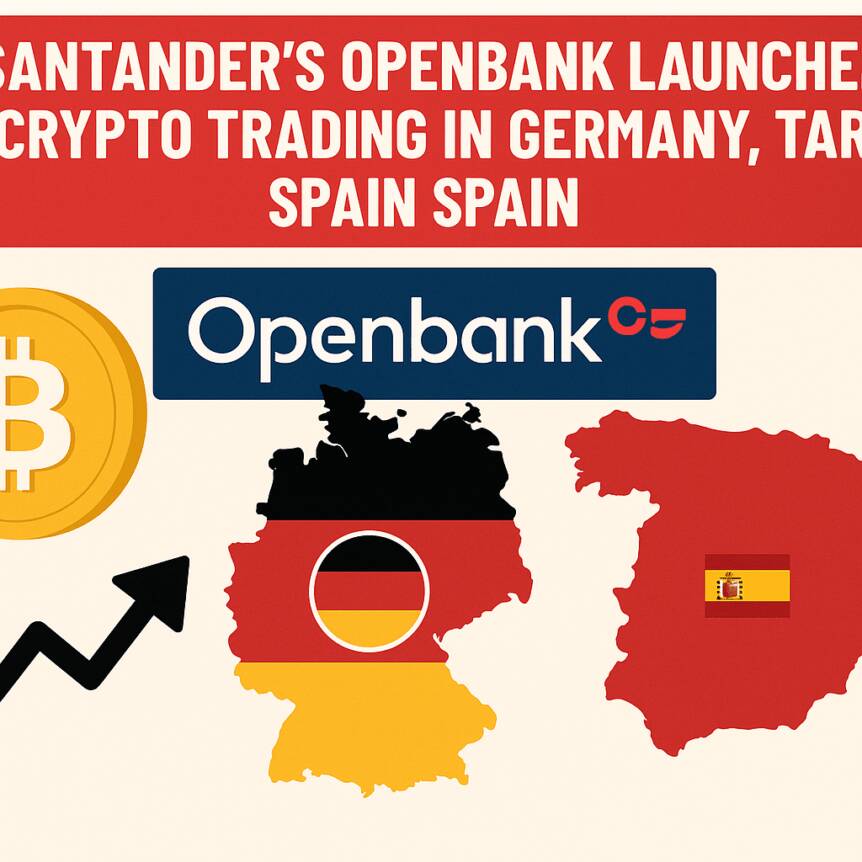Santander’s Openbank Launches Crypto Trading in Germany, Targets Spain
Grupo Santander’s Digital Bank Launches Crypto Trading in EuropeOpenbank, the fully digital subsidiary of Grupo Santander, is expanding its footprint across Europe with a new cryptocurrency trading service...

Grupo Santander’s Digital Bank Launches Crypto Trading in Europe
Openbank, the fully digital subsidiary of Grupo Santander, is expanding its footprint across Europe with a new cryptocurrency trading service tailored for German clients. This move comes in response to increasing demand for digital assets and aims to provide a seamless experience for buying, selling, and holding major cryptocurrencies.
Starting this week, users in Germany can trade Bitcoin (BTC), Ether (ETH), Litecoin (LTC), Polygon (MATIC), and Cardano (ADA) directly on the Openbank platform. The new service integrates cryptocurrencies into its established suite of investment products, offering a streamlined alternative to third-party platforms while operating under the comprehensive European Markets in Crypto-Assets (MiCA) regulation framework.
Santander has outlined plans to introduce similar crypto trading features in Spain shortly, with additional functionalities such as crypto-to-crypto conversions and more token options expected soon. According to Coty de Monteverde, head of crypto at Grupo Santander, the move responds to clear customer demand for digital assets within traditional banking services.
“Adding crypto to our trading platform reflects our commitment to meet client needs in the evolving financial landscape,”
– Coty de Monteverde

While Openbank’s entry into crypto trading is a recent development, Santander has historically explored blockchain applications, including the launch of Ripple-powered cross-border payment solutions in 2018. The bank has also expressed interest in stablecoins, contemplating issuing its own or participating in existing projects, aiming to stay at the forefront of crypto innovation.
Crypto Adoption Grows Among Germany’s Leading Banks
The expansion of Santander’s crypto offerings is part of a broader movement among Germany’s largest banks preparing to incorporate crypto assets into their services. Notably, DZ Bank launched a crypto pilot program across 700 cooperative banks in September 2024, leveraging Börse Stuttgart Digital’s infrastructure. Similarly, Deutsche Bank announced plans to establish a digital asset custody service in 2026, partnering with Austrian startup Bitpanda and Swiss firm Taurus.
Deutsche Bank’s executives have also indicated interest in stablecoin markets, exploring the issuance of their own tokens or participating in existing initiatives to facilitate crypto payments and settlements.
In addition, Sparkassen-Finanzgruppe plans to roll out retail crypto trading to its nearly 50 million German customers by mid-2026, supported by DekaBank and Börse Stuttgart Digital.
These developments highlight a significant shift in Europe’s traditional banking landscape, driven by regulatory clarity through frameworks like MiCA, which is fostering increased participation in the fast-growing crypto markets. U.S. banks are also ramping up their crypto initiatives, with major institutions exploring stablecoin creation and digital asset services following recent legislative advances.
Crypto Investing Risk Warning
Crypto assets are highly volatile. Your capital is at risk. Don’t invest unless you’re prepared to lose all the money you invest. Read the full disclaimer
Affiliate Disclosure
This article may contain affiliate links. See our Affiliate Disclosure for more information.
Delegate Your Voting Power to FEED DRep in Cardano Governance.
DRep ID: drep12ukt4ctzmtf6l5rj76cddgf3dvuy0lfz7uky08jfvgr9ugaapz4 | We are driven to register as a DRep by our deep dedication to the Cardano ecosystem and our aspiration to take an active role in its development, ensuring that its progress stays true to the principles of decentralization, security, and community empowerment.DELEGATE VOTING POWER!







